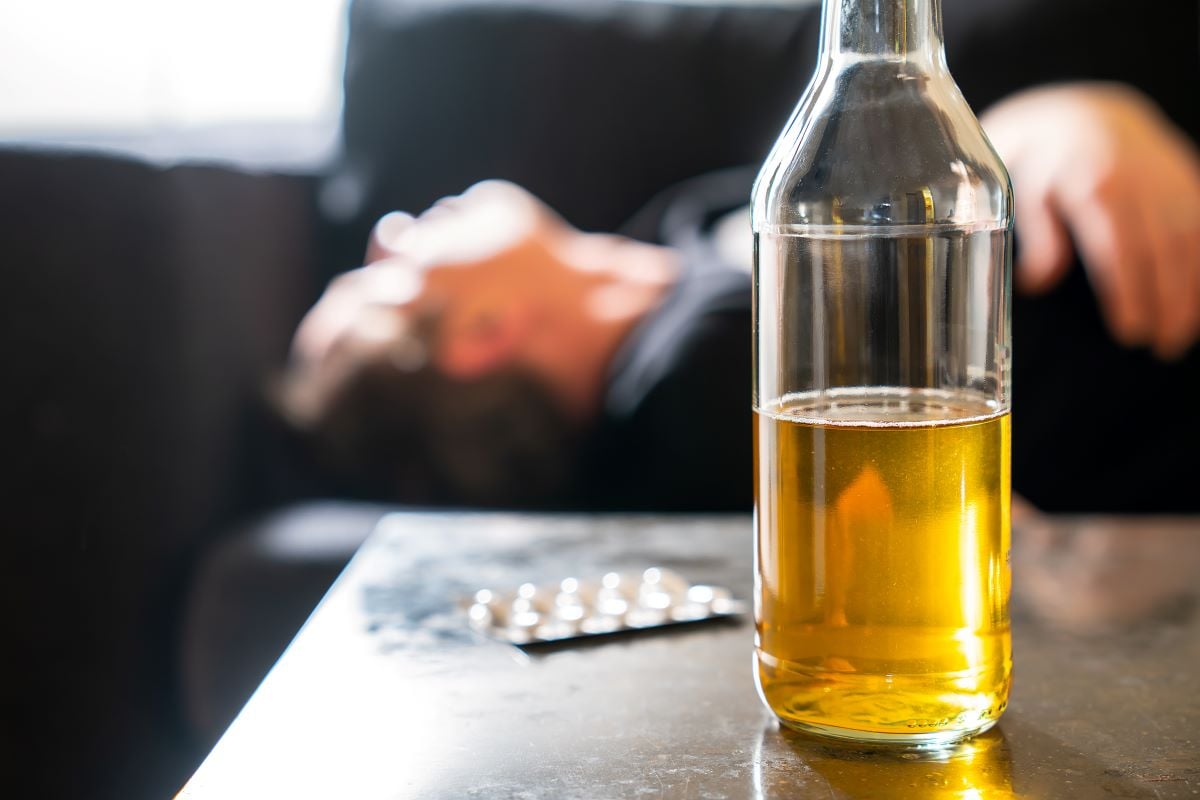Sleeping pills, both prescribed and over the counter, are widely used to help people fall asleep. Because they are sedatives, sleeping pills help to calm the central nervous system and cause the user to feel drowsy and sleepy. Sleeping pills include:
- Benzodiazepines- Ativan, Valium, Halcion, Restoril
- Non-benzodiazepines- Lunesta, Sonata, Albien, Zolpimist
- DORAs (Dual orexin 1 and 2 receptor antagonists)- Belsomra, Dayvigo, Quiviviq
Many people assume that since alcohol is also a sedative, it is safe to take sleeping pills with alcohol, while others mix the two for the immediate pleasurable after-effects The reality is that combining these two substances is dangerous because they compound each others’ effects, which can have a devastating impact on the brain and body. Join Avenues Recovery, leading addiction treatment experts to understand the risks and effects associated with mixing alcohol and sleeping pills.
Alcohol and Sleeping Pills Side Effects
The side effects of sleeping pills in alcohol are no joke. Since both sleeping pills and alcohol are central nervous depressants, they can interact together to slow down - or even shut down completely - different internal organs.
Every person is different, and every type of alcoholic beverage and sleeping pill produces a different reaction, so it’s impossible to know the exact effects of mixing the two substances. However, these are some common effects that many people experience:
- Drowsiness - The person will be very tired but experience a very fitful, light sleep that leaves them feeling disoriented and agitated when they wake up.
- Interactions while sleeping - Sleeping pills in alcohol can cause sleep-walking, sleep-eating, sleep-driving, and other dangerous behaviors during their sleep.
- Impaired coordination, memory function, perception, and balance - These impairments can cause accidents, injuries, unintended breaking of the law resulting in arrest, and other negative occurrences.
- ADR (Adverse Drug Reaction) - Adverse drug reactions will be different for every user, but someone experiencing an ADR almost always needs to be admitted to a hospital.
- Heart attack - Heart attacks occur when the mixed sleeping pills and alcohol are particularly strong, causing the heart to stop working.
- Overdose - An overdose can happen when the amount of sleeping pills and alcohol taken affects the heart or slows the breathing completely.
- Respiratory depression - Can alcohol and sleeping pills kill you? Mixing alcohol with sleeping pills can slow or stop breathing, which is life-threatening, and can lead to death.
Sleeping Pills Commonly Used with Alcohol
Listed below are some sleeping pills or sleep aids commonly used with alcohol:
ZzzQuil and Alcohol: ZzzQuil (diphenhydramine) is an over-the-counter sleep aid. Combining ZzzQuil with alcohol can increase drowsiness and impair motor skills.
Melatonin and Alcohol: Melatonin is a hormone supplement used to regulate sleep-wake cycles. Mixing melatonin and alcohol can be dangerous and can lead to severe drowsiness, dizziness, and impaired motor skills. In extreme cases, it can cause respiratory issues and increase the risk of accidents, potentially leading to death. This highlights the serious risks associated with melatonin and alcohol death.
Ambien and Alcohol: Ambien (zolpidem) is a prescription medication for insomnia. Mixing Ambien with alcohol can enhance sedative effects, leading to increased drowsiness, dizziness, and risk of overdose.
Trazodone and Alcohol: Trazodone is a prescription antidepressant often used off-label for insomnia. Combining trazodone with alcohol can increase sedation, dizziness, and the risk of severe side effects like respiratory depression.
Why Do People Mix Alcohol and Sleeping Pills
Unawareness of the risks: Many people might not realize the dangers of mixing drugs and alcohol. One might unintentionally mix sleeping pills with alcohol, not realizing the potential for dangerous interactions, and that just a few sips of alcohol after taking your sleeping pill can be irreversibly damaging.
Immediate Pleasure: Other people who abuse sleeping pills or alcohol may intentionally take both substances together to increase the immediate pleasurable after-effects from their substance of choice, regardless of the risks involved.
Increased Sedation: A study in the United States found that insomnia affects one-third of the general population. People with insomnia often turn to both sleeping pills and alcohol to help them sleep, seeking the combined sedative effects. However, alcohol can actually contribute to insomnia, creating a vicious cycle.
How Long After Drinking Can You Take a Sleeping Pill?
It’s generally recommended to wait at least six hours after drinking alcohol before taking a sleeping pill. This waiting period helps to avoid dangerous interactions between the alcohol and the medication. Similarly, if you’ve already taken a sleeping pill, it’s best to avoid drinking alcohol for at least six hours.
This applies to both over-the-counter (OTC) and prescription sleeping pills. So if you are wondering: can I take melatonin after drinking? It’s best to wait the same six-hour period to ensure safety.
Treatment for Sleeping Pills and Alcohol Addiction
Addiction to sleeping pills and alcohol can be treated through both inpatient rehab and outpatient programs. The treatment plan usually includes a mix of the following approaches:
Medical Detox: This is often the first step to manage withdrawal symptoms under medical supervision safely.
Behavioral Therapies: These include cognitive-behavioral therapy (CBT), individual counseling, group therapy, and family therapy to address the psychological aspects of addiction.
Co-occurring Disorder Treatment: If there are underlying mental health issues, integrated treatment for both the addiction and the mental health condition is crucial.
Support Groups: Joining groups like Alcoholics Anonymous (AA) or Narcotics Anonymous (NA) can provide ongoing support and community.
Get Help for Sleeping Pills and Alcohol Addiction with Avenues Recovery
Combining sleeping pills with alcohol is extremely dangerous and potentially deadly. If you or a loved one is struggling with addiction, now is the time to seek help. Avenues Recovery Center offers expert support and personalized treatment plans to guide you toward lasting recovery. Our compassionate and experienced staff are dedicated to helping you achieve a life of freedom and peace. Reach out to Avenues Recovery today and take the first step towards a brighter future.



